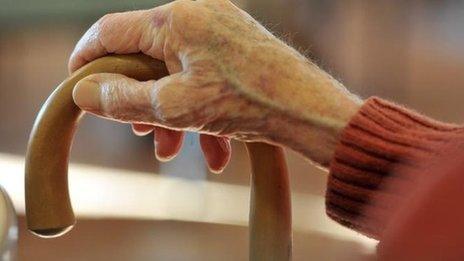Elderly emergency admissions rising
- Published

Urgent action is needed to stem the rise in avoidable emergency admissions among the elderly, regulators say.
Data collected by the Care Quality Commission showed 530,000 over-65s were admitted in England as an emergency for a preventable cause last year.
This represents an increase of more than 40% since 2007-8.
Avoidable admissions are caused by conditions such as dehydration or infections which could have been prevented with better care.
In total, one in 10 of all over-75s and a fifth of the over-90s were admitted for one of these reasons.
CQC chief executive David Behan said the problem needed "quickly" addressing.
"GPs, care homes, home care agencies, community health services and hospitals must plan effectively to make sure our older and more vulnerable people are cared for in the way they deserve."
Emergency admissions are one of the main reasons why A&E units have been struggling in recent years.
Patients who need to be admitted take much longer to attend to, compared with people who can be seen and treated in A&E.
A recent report, external by the National Audit Office estimated emergency admission were costing the NHS over £12bn a year.
'Shocking'
The CQC report - its annual State of Care review - also highlighted common themes found during the 35,000 inspections made in 2012-13.
Evidence of poor care was found in one in 10 hospitals - in half of cases this was judged to have had a moderate or major impact on patients.
Those with dementia continued to have among the worst outcomes.
Problems on a similar scale were identified in social care.
However, the findings are based on an inspection regime that has now been radically revamped.
The CQC has recruited three chief inspectors - covering hospitals, GPs and hospitals - and introduced tougher checks.
Nonetheless, Anna Bradley, chair of Healthwatch England, the patient watchdog, said: "This report highlights some shocking statistics."
- Published15 November 2013
- Published13 November 2013
- Published8 October 2013